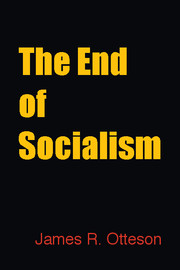Book contents
- Frontmatter
- Dedication
- Contents
- Preface
- Acknowledgments
- 1 What Socialism and Capitalism Are
- Part I Socialism’s Problems in Practice
- Part II Socialism’s Problems in Principle
- 6 Economics and Morality
- 7 Respect and Individuality
- 8 Socialism’s Great Mistake
- 9 Prosperity
- 10 Equality and Freedom
- 11 Fairness
- Conclusion
- Bibliography
- Index
8 - Socialism’s Great Mistake
Published online by Cambridge University Press: 05 October 2014
- Frontmatter
- Dedication
- Contents
- Preface
- Acknowledgments
- 1 What Socialism and Capitalism Are
- Part I Socialism’s Problems in Practice
- Part II Socialism’s Problems in Principle
- 6 Economics and Morality
- 7 Respect and Individuality
- 8 Socialism’s Great Mistake
- 9 Prosperity
- 10 Equality and Freedom
- 11 Fairness
- Conclusion
- Bibliography
- Index
Summary
Introduction
The disrespect socialist-inclined policy exhibits toward the equal moral agency of individual human beings rests, I argue, on a crucial factual mistake, namely, seeing people as essentially members of classes or groups, instead of as individuals. I do not claim that people do not form groups or associations; of course they do. I also do not claim that it is not fruitful and appropriate in some contexts to think of people as members of groups or classes, even to ascribe, again in the appropriate contexts, causal agency to the group. We can speak of people as Roman Catholics or Jews, as New Yorkers or as Americans; we can speak of the New York Giants as having won the 2011 Super Bowl, of Americans preferring football to soccer, and so on. When Margaret Thatcher said in 1987 that “there is no such thing as society,” she was clearly mistaken, even if we understand the intent of her remark. The great mistake that socialism makes lies not in its assumption that there are groups, that people can act jointly in groups, or that the existence of groups can influence its members and their relations to one another in various ways. Socialism’s mistake is instead in its attempt to treat people as mere members of groups.
Individuals and Groups
Human beings are distinct, and discrete, consciousnesses. They associate with one another, influence one another, and coerce one another, but they do not, and cannot, coalesce into a single consciousness. Within their complex webs of connection and interdependence, each of them nevertheless remains a single, separate consciousness. They remain separate decision centers, with separate and unique reservoirs of knowledge and schedules of value. A married couple might pledge to one another never to make a decision again except jointly and unanimously: even if they kept this (surprisingly difficult) promise to one another, and even if in time they came to have largely overlapping reservoirs of local knowledge and schedules of value, they would still, in fact, remain separate and discrete consciousnesses. Consider members of the same voice in a choir, or members of a monastery, or residents of a kibbutz: Harmony of some specific purposes? Yes. Consonance of action or behavior in the service of these specific purposes? Yes.
- Type
- Chapter
- Information
- The End of Socialism , pp. 133 - 138Publisher: Cambridge University PressPrint publication year: 2014



